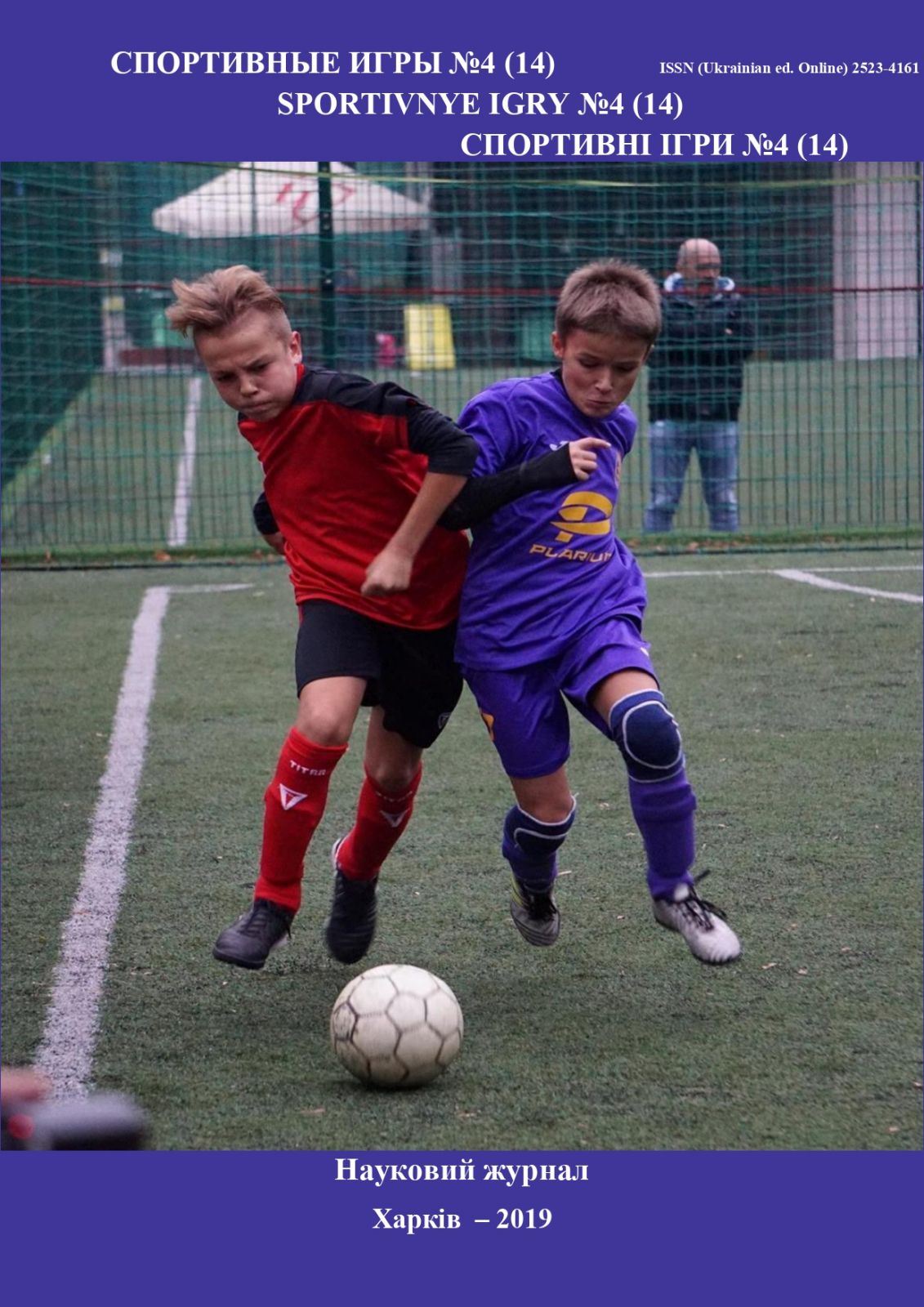Character features of handball referees
DOI:
https://doi.org/10.15391/si.2019-4.14Keywords:
handball, referees, temperament, emotion, aggression, motivations, accentuations, subjective control, self-controlAbstract
Purpose: it consists in certain characteristic characteristics of the personality of handball
referees. Material and methods: the following methods of the research were used: psycho-pedagogical questionnaire and testing of psychological structure of temperament (B. Smirnov),
emotionality (E. Ilyin), aggressive behavior (E. Ilyin, P. Kovaliov), motivation (A. Rean),
characteristic accentuations of personality (K. Leongard), subjective control (J. Rotter), self-control in communication (M. Snyder); methods of mathematical processing of the obtained results.
4 referees of the European category, 3 referees of the second category and referees of the National
and First categories participated in the research. Results: The research revealed that the handball
arbitrator, whose extroversion prevails, is confident and determined, and on turnover, introverts
are more "closed" and less determined. The negative impact of emotions on efficiency of activity
was observed in referees of the initial category. At the same time, referees of the European category
are independent of emotional excitability, intensity and duration of emotions. Such indicators were
derived from more extensive work on their mistakes and experience. European category referees
(Ruslan V. and Victoriya Zh.) were found to have elevated levels of direct verbal and physical
aggression, suggesting rapid emotional excitability. But, at the same time, they have strong
restraint in difficult situations of competitive activity. Subjective control is fully exercised by
arbitrators Ruslan L. (referee of the European category), Pavel G. and Valeria V. (referees of the
national category). They have responsibility and objective self-analysis of their decisions during the
match. Conclusions: The results of psychological research prove that handball referees are able to
clearly, qualitatively and objectively assess actions and game actions of sportsmen. But only deep
knowledge of theoretical aspects combined with constant practical work, is a guarantee in carrying
out competitions by referees at a high level that is without serious mistakes.
References
Вейнберг, Р. С. Гоулд, Д. (2001). Психологія спорту. К. : Олімпійська література.
Вундт, В. (2017). Психология в борьбе за существование. Reflexio, Т. 10, 2, 57-82.
Гринь, О. Р. (2015). Психологічне забезпечення та супровід підготовки кваліфікованих спортсменів. Київ : Олімпійська література.
Гузар, В. М., Шалар, О. Г., & Мордюк, Д. (2016). Міжособистісні відношення гандболісток і їх вплив на змагальну діяльність. Вісник Чернігівського національного педагогічного університету імені Т.Г. Шевченка. Вип. 139. Т.ІI, 218-222.
Еделев, О. С., Шалар, О. Г., Верхогляд, Д. (2014). Вплив авторитету тренера на спортивну діяльність веслярів-академістів. Вісник Чернігівського національного педагогічного університету. Чернігівський національний педагогічний університет імені Т.Г. Шевченка, 108-111
Ильин Е. П. (2010) Психология спорта. СПб. : Питер.
Кедровский, Б. Г., Шалар, О. Г., Гриневич, А. В. (2013). Взаимопонимание тренеров с юными спортсменами. Физическое воспитание студентов, 4, 31-34. doi: 10.6084/m9.figshare.669666
Козіна, Ж. Л., Слюсарев, В. Ф., & Волков, Є. П. (2004). Факторна структура підготовленості гандболістів високого класу. Педагогіка, психологія та мед-біологічні проблеми фізичного виховання і спорту, 13, 39-47.
Коцан, І. Я., Ложкін, Г. В., & Мушкевич, М. І. (2011). Психологія здоров’я людини. Луцьк: РВВ ―Вежа.
Жосан, I. А., Стрикаленко, E. A., & Шалар, O. Г (2014). Методика развития и комплексный контроль скоростно-силовых качеств гандболисток высокого класса. Педагогіка, психологія та медико-біологічні проблеми фізичного виховання і спорту, 9, 24-29.
Платонов, В. (2018). Cтруктура и содержание непосредственной подготовки спортсменов высокой квалификации к главным соревнованиям. Наука в олимпийском спорте, 2,17-41.
Подтикан, М. П., Помещикова, І. П., & Ширяєва, І. В. (2017). Рівень підготовленості баскетбольних арбітрів до змагань. Спортивні ігри, (4), 42-46.
Помещикова, І. П., Микита, П. П., & Ломан, С. А. (2018). Напрями підготовки арбітрів у баскетболі. Проблеми і перспективи розвитку спортивних ігор і єдиноборств у вищих навчальних закладах, 2, 66-70.
Помещикова, І. П., Пащенко, Н. О., & Печников, О. Д. (2013). Підвищення рівня спеціальної підготовленості молодих баскетбольних арбітрів. Слобожанський науковоспортивний вісник, (5 (38)), 192-195.
Стрикаленко, E. A., & Шалар, O. Г., (2017). Вплив інтелектуальних здібностей на ефективність змагальної діяльності гандболісток високого класу. Вісник Чернігівського національного педагогічного університету імені Т.Г. Шевченка, Вип. 147, Т.ІІ., 255-258.
Уэйнберг, Р. С. & Гоулд, Д. (1998). Основы психологии спорта и физической культуры. Киев : Олимпийская литература.
Шалар, О. Г., Снопова, Ю. А. & Стрикаленко, Е. А. (2010). Психологическая совместимость женской гандбольной команды. Физическое воспитание студентов, 1, 109-112.
Шалар, O., Жосан, І., Шум, Д. & Стрикаленко, Є. (2014). Властивості темпераменту і волі гандболісток різного ігрового амплуа. Спортивний вісник Придніпров’я, 40-43.
Шалар, О., Милославський, М., & Федіна, А. (2009) Особливості підготовки арбітрів у гандболі. Актуальні проблеми юнацького спорту, 48-54
Шалар, О. Г., Стрикаленко, Є. А., Гузар, В. М. (2019). Особливості формування командної згуртованості юних спортсменок в ігрових видах спорту. Спортивні ігри, 3 (13), 64-73. doi: 10.15391/si.2019-3.08
Яковлев, Б. П., Бабушкин, Г. Д., Науменко, Е. А., Сальников, В. А., Апокин, В. В.,
Бабушкин, Е. Г., Шумилин, А. П. (2016). Психология физической культуры. Москва: Спорт.
Strykalenko, Yevgeniy, Zhosan, Ihor & Shalar, Oleh. (2017). Intellectual abilities high-end handball players of different playing roles. Фізичне виховання, спорт і культура здоров’я у сучасному суспільстві, 4 (40), 128-133.
Huzar, V. M. (2001). The process of physical culture and sport management. Pedagogics, psychology, medical-biological problems of physical training and sports, 17, 9-18.
Huzar, V. N., Shalar, O. H., Norik, A. O. (2014). Relationship as an aspect of psychological climate of women's soccer team. Physical education of students, 2, 8-12. doi:10. 6084/m9.fighare.906307













